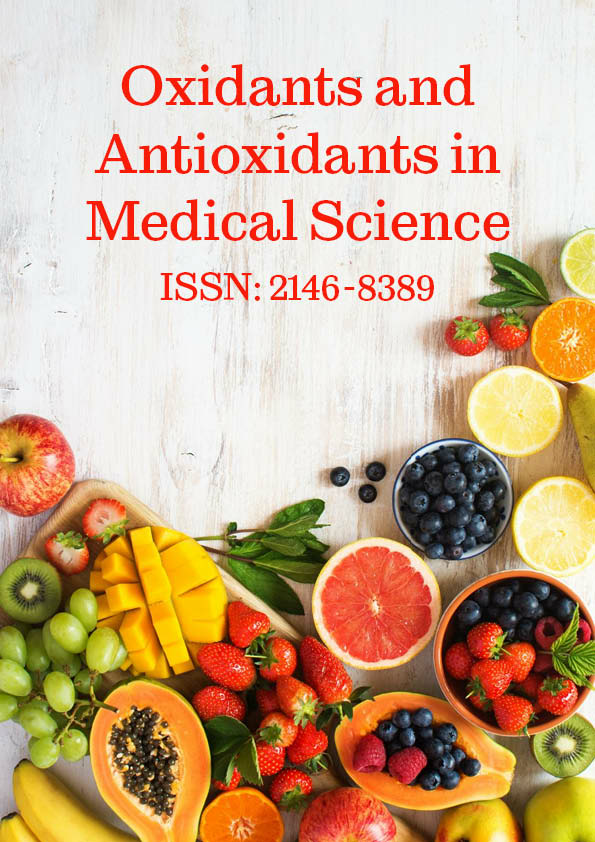Commentary - Oxidants and Antioxidants in Medical Science (2023)
Avenanthramides and Beta-Glucans: Elucidating the Antioxidant Dynamics of Oats
Xeuyhun Ru*Xeuyhun Ru, Department of Food Science and Nutrition, Donghua University, Shanghai, China, Email: XeuyhunRu@126.com
Received: 07-Oct-2023, Manuscript No. EJMOAMS-23-122709; Editor assigned: 11-Sep-2023, Pre QC No. EJMOAMS-23-122709 (PQ); Reviewed: 25-Sep-2023, QC No. EJMOAMS-23-122709; Revised: 02-Oct-2023, Manuscript No. EJMOAMS-23-122709 (R); Published: 09-Oct-2023
Description
Oats, often celebrated for their heart-healthy properties and versatility in breakfast recipes, are more than just a satisfying bowl of oatmeal. Beyond their reputation as a wholesome grain, oats pack a powerful punch of antioxidants that contribute significantly to their nutritional profile. In this article, we will delve into the fascinating world of antioxidants present in oats, exploring their benefits and shedding light on why oats are a valuable addition to a health-conscious diet.
Antioxidants in oats
Oats are rich in a variety of antioxidants that play a crucial role in promoting health and protecting the body from oxidative stress. One prominent group of antioxidants found in oats is avenanthramides. These unique compounds, exclusive to oats, have been the focus of various studies for their potential health benefits.
Avenanthramides
Avenanthramides are polyphenolic compounds that exhibit strong antioxidant and anti-inflammatory properties. These antioxidants are found in the bran layer and endosperm of oats, making whole oats or minimally processed oat products the ideal choice for maximizing their intake. Research suggests that avenanthramides may contribute to cardiovascular health by helping to relax blood vessels and reduce inflammation, ultimately supporting optimal blood flow.
Beta-glucans: While beta-glucans are renowned fortheir role in providing soluble fiber, they also contribute to the antioxidant arsenal of oats. Beta-glucans are a type of polysaccharide that not only aids in cholesterol management but also possesses antioxidant properties. These compounds help neutralize free radicals, preventing cellular damage and supporting overall health.
Vitamins and minerals: Oats are not only a source ofavenanthramides and beta-glucans but also provide essential vitamins and minerals that contribute to their antioxidant content. Vitamin E, a powerful fatsoluble antioxidant, is present in oats and contributes to protecting cells from oxidative damage. Additionally, oats contain trace minerals like selenium, which acts as a cofactor for antioxidant enzymes, further enhancing the overall antioxidant defense system.
Benefits of oats antioxidants
Heart health: The avenanthramides in oats contributeto cardiovascular health by promoting blood vessel dilation and reducing inflammation. Regular consumption of oats has been associated with a lower risk of heart disease, making it a heart-friendly addition to one’s diet.
Anti-inflammatory properties: Oats antioxidants,particularly avenanthramides, exhibit anti-inflammatory effects, which can be beneficial in managing chronic inflammation associated with various health conditions, including arthritis and inflammatory bowel diseases.
Cellular protection: The antioxidants in oats play acrucial role in protecting cells from oxidative damage. This cellular protection is essential for maintaining overall health and reducing the risk of chronic diseases.
Blood sugar regulation: Beta-glucans in oatscontribute not only to antioxidant defense but also help regulate blood sugar levels. This makes oats a valuable food choice for individuals looking to manage or prevent diabetes.
Incorporating oats into your diet
Classic oatmeal: Start your day with a hearty bowl ofoatmeal topped with fresh fruits and nuts. This simple yet nutritious breakfast provides a substantial dose of antioxidants to kickstart your morning.
Smoothies: Add oats to your favourite smoothie recipes for an extra boost of antioxidants. The texture and mild flavor of oats make them a versatile addition to any fruit or vegetable smoothie.
Baking: Use oat flour or incorporate oats into baked goods like muffins, cookies, and granola bars. This not only enhances the nutritional value of your treats but also introduces the antioxidant goodness of oats.
Oats stand out as a nutritional powerhouse, not only for their fiber content but also for the abundance ofantioxidants they offer. From avenanthramides to beta-glucans and essential vitamins and minerals, oats provide a holistic approach to health, supporting heart health, reducing inflammation, and protecting cells from oxidative stress. By embracing the diverse ways to include oats in your diet, you can unlock the full potential of these antioxidants and savor the many health benefits they bring to the table. So, the next time you enjoy a warm bowl of oatmeal or bite into an oat-packed snack, savor not only the taste but also the nourishing antioxidants that contribute to your well-being.







